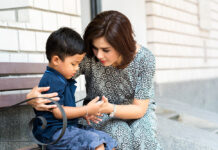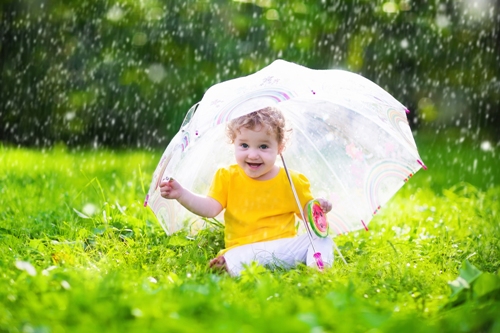This post is also available in: English हिन्दी (Hindi) বাংলা (Bengali) தமிழ் (Tamil) മലയാളം (Malayalam)
In my years of practicing as a parenting consultant – I have found that parents are most excited about teaching their babies everything they can – as soon as they can.
Are you excited?
Then read on to find out how your baby is learning so that you can be an effective teacher.
How do babies learn?
- Babies learn through touch.
The skin is the largest sense organ of the body. And within a few hours of birth your baby learns to identify your touch. From the way you hold your baby – your baby learns whether the world is a safe place or a scary place. It is important for your baby to think of the world as a safe place. If your baby feels unsafe – they will be too scared to learn anything else.
Help your baby learn through touch –
- Hold your baby skin-to-skin.
- Practice baby wearing
- Do not put mittens on your baby’s hands.
2. Babies learn through sight.

All of us learn by seeing. And your baby is no different. At first however, your baby can only see things that are within 12 inches of their eyes. Slowly as their vision improves – they can start seeing things that are further away. They also start seeing things that are not directly in their line of vision.
Help your baby develop good seeing skills –
- Look into your baby’s eyes as you breastfeed.
- Show and describe things around the house.
- Allow your baby free time to stare at their hands and other objects around them.
3. Babies learn by listening.

Even before your baby is born – they can recognize your voice and heartbeat. After birth, your baby slowly learns to look in the direction of your voice and match face with voice. They also learn to recognize other sounds and get startled by loud noises.
Listening skills are crucial for future learning.
Build your baby’s listening skills –
- Talk to your baby a lot in a high-pitched sing song voice.
- Talk about other sounds like the doorbell or the car horn.
4. Babies learn by imitating.

Babies are programed to imitate everything we do and that is how they learn. You will find your baby looking at you with wide eyed concentration when you speak and trying to copy the way you move your mouth.
Help your baby to build imitation skills –
- Open your mouth wide when you speak.
- Make exaggerated facial expressions.
- Put your tongue out and wait for your baby to imitate.
5. Babies learn by exploring.

The world is waiting to be discovered by your baby. But before your baby can discover the world, they must learn to move around and grasp things and pick them up.
Help your baby move –
- Ensure lots of tummy time.
- Encourage turning over and crawling.
- Allow self-feeding early so that they can practice their grasp.
6. Babies learn by experimenting.

Babies are little scientists. They learn about the world by doing little experiments.
Help your baby discover the world –
- Encourage water play to help them learn about cause and effect.
- Allow your baby to drop things to learn about gravity.
To raise an enthusiastic and rapid learner – pay close attention to what your baby is trying to learn and facilitate it by participating in it.
By
Dr. Debmita Dutta MBBS, MD

Dr. Debmita Dutta MBBS, MD is a practicing doctor, a parenting consultant, and the founder of WPA whatparentsask.com
She conducts online and offline workshops on parenting for schools and corporate organisations. She also conducts online and offline prenatal and infant care classes. She is a well-known thought-leader in parenting and an expert on play, learning and eating habits. Her books on parenting are published by Juggernaut Books and are among their most read books. She is frequently quoted in national and international publications of repute for her empathetic and compassionate approach to parenting and her application of physiology and brain science to parenting.
This post is also available in: English हिन्दी (Hindi) বাংলা (Bengali) தமிழ் (Tamil) മലയാളം (Malayalam)










